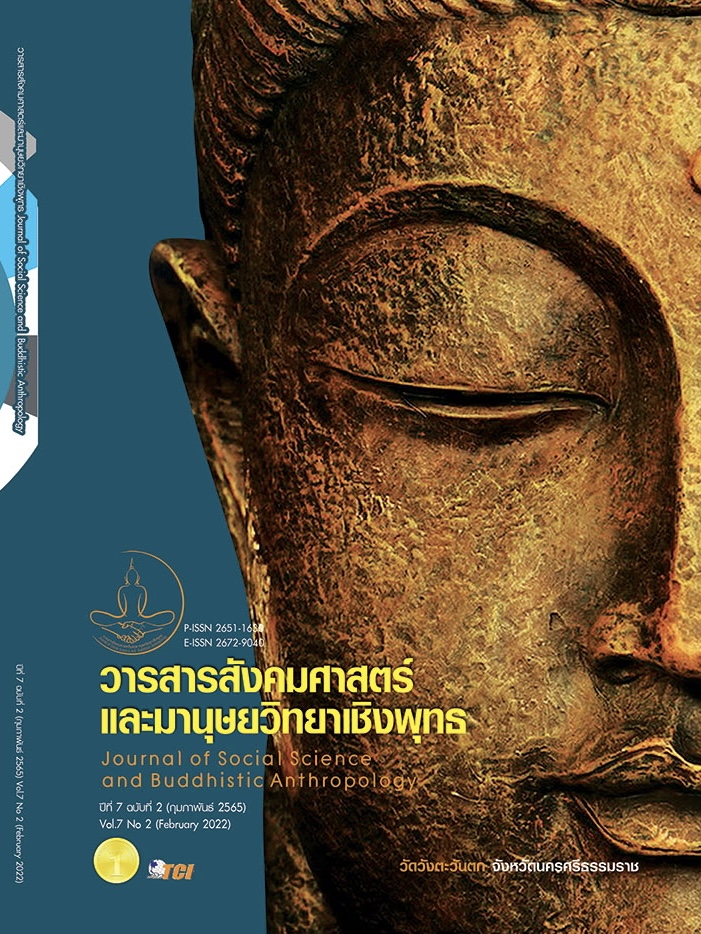FACTORS RELATED TO SOCIAL SKILLS EARLY INTERVENTION FOR CHILDREN STARTING INCLUSIVE PRIMARY SCHOOLFACTORS RELATED TO SOCIAL SKILLS EARLY INTERVENTION FOR CHILDREN STARTING INCLUSIVE PRIMARY SCHOOL
Keywords:
Early Intervention, Social Skill, Inclusive SchoolAbstract
The objectives of this research article were to: 1) study the supporting factors to social skills early intervention for children starting inclusive primary school. 2) study the barrier factors to social skills early intervention for children starting inclusive primary school. 3) study the guidelines for resolving the limitation to social skills early intervention for children starting inclusive primary school. This research is a qualitative research. The key informants were teachers in kindergarten 2 or Kindergarten 3, teachers in elementary school level 1 and special education teachers in inclusive school, total of 15 people. They were selected through purposive sampling according to the specified criteria. The research tools were semi-structured interview forms and semi-structured interview recordings. The data were analyzed by content analysis. The research results were found that 1) The supporting factors to social skills early intervention for children starting inclusive primary school were family, teacher and school, starting training and continuous training and social skills training techniques 2) The barrier factors to social skills early intervention for children starting inclusive primary school were family, school personnel, the school system, social change, and the barriers from the children. and 3) The guidelines for resolving the limitations to social skills early intervention for children starting inclusive primary school were family participation, teaching management and knowledge understanding of school personnel.The objectives of this research article were to: 1) study the supporting factors to social skills early intervention for children starting inclusive primary school. 2) study the barrier factors to social skills early intervention for children starting inclusive primary school. 3) study the guidelines for resolving the limitation to social skills early intervention for children starting inclusive primary school. This research is a qualitative research. The key informants were teachers in kindergarten 2 or Kindergarten 3, teachers in elementary school level 1 and special education teachers in inclusive school, total of 15 people. They were selected through purposive sampling according to the specified criteria. The research tools were semi-structured interview forms and semi-structured interview recordings. The data were analyzed by content analysis. The research results were found that 1) The supporting factors to social skills early intervention for children starting inclusive primary school were family, teacher and school, starting training and continuous training and social skills training techniques 2) The barrier factors to social skills early intervention for children starting inclusive primary school were family, school personnel, the school system, social change, and the barriers from the children. and 3) The guidelines for resolving the limitations to social skills early intervention for children starting inclusive primary school were family participation, teaching management and knowledge understanding of school personnel.
References
กระทรวงศึกษาธิการ. (2560). หลักสูตรการศึกษาปฐมวัย พุทธศักราช2560. กรุงเทพมหานคร: สำนักวิชาการและมาตรฐานการศึกษา สำนักงานคณะกรรมการการศึกษาขั้นพื้นฐาน.
คณะกรรมการร่างรัฐธรรมนูญ สำนักงานเลขาธิการสภาผู้แทนราษฎร. (2560). รัฐธรรมนูญแห่งราชอาณาจักรไทย. กรุงเทพมหานคร: สำนักการพิมพ์ สำนักงานเลขาธิการสภาผู้แทนราษฎร.
นาถลดา ตะวันกาญจนโชติ. (2559). ทักษะทางสังคมของเด็กออทิสติกวัยเรียน. วารสารการพยาบาลจิตเวชและสุขภาพจิต, 30, (2), 1-21.
พัชริดา นิลสุข. (2558). การบริหารโรงเรียนแกนนำจัดการเรียนร่วม. ใน วิทยานิพนธ์ศึกษาศาสตรมหาบัณฑิต สาขาวิชาการบริหารการศึกษา. มหาวิทยาลัยศิลปากร.
เพ็ญแข ลิ่มศิลา. (2540). การวินิจฉัยโรค-ออทิสซึม. สมุทรปราการ: ช.แสงงา การพิมพ์.
ศรีเรือน แก้วกังวาน. (2556). จิตวิทยาพัฒนาการชีวิตทุกช่วงวัย. (พิมพ์ครั้งที่ 9). กรุงเทพมหานคร: สำนักพิมพ์มหาวิทยาลัยธรรมศาสตร์.
สราวดี เพ็งศรีโคตร และจันทร์ชลี มาพุทธ. (2554). รูปแบบการมีส่วนร่วมของผู้ปกครองในการจัดการศึกษาปฐมวัย. วารสารการศึกษาและพัฒนาสังคม, 7, (1), 68-82.
สํานักบริหารงานการศึกษาพิเศษ. (2558). หลักสูตรสำหรับเด็กที่มีความต้องการจำเป็นพิเศษระยะแรกเริ่มของศูนย์การศึกษาพิเศษ ฉบับปรับปรุง พุทธศักราช 2558 . กรุงเทพมหานคร: โรงพิมพ์สำนักงานพระพุทธศาสนา.
สำนักงานคณะกรรมการการศึกษาแห่งชาติ. (2545). พระราชบัญญัติการศึกษาแห่งชาติ พ.ศ. 2542 และที่แก้ไขเพิ่มเติม (ฉบับที่ 2) พ.ศ.2545. กรุงเทพมหานคร: พริกหวานกราฟฟิค จำกัด.
สำนักงานคณะกรรมการพัฒนาการเศรษฐกิจและสังคมแห่งชาติ . (2560). แผนพัฒนาเศรษฐกิจและสังคมแห่งชาติฉบับที่ 12 (พ.ศ. 2560 - 2564). กรุงเทพมหานคร: สำนักนายกรัฐมนตรี.
สำนักงานคณะกรรมการพัฒนาการเศรษฐกิจและสังคมแห่งชาติ. (2560). ยุทธศาสตร์ชาติระยะ 20 ปี (พ.ศ. 2560 - 2579). กรุงเทพมหานคร: สำนักนายกรัฐมนตรี.
สำนักงานเลขาธิการสภาการศึกษา. (2560). แผนการศึกษาแห่งชาติ (พ.ศ. 2560 – 2579). กรุงเทพมหานคร: บริษัท พริกหวานกราฟฟิค จำกัด.
สำนักงานส่งเสริมและพัฒนาคุณภาพชีวิตคนพิการ. (2551). พระราชบัญญัติการจัดการศึกษาสำหรับคนพิการ พ.ศ. 2551. กรุงเทพมหานคร: สำนักบริหารงานการศึกษาพิเศษ.
สุวิมล อุดมพิริยะศักดิ์. (2558). การจัดประสบการณ์เพื่อพัฒนาเด็กที่มีความต้องการพิเศษ. นนทบุรี: สำนักพิมพ์มหาวิทยาลัยสุโขทัยธรรมาธิราช.
อุษณีย์ อนุรุทธ์วงศ์. (2552). สร้างลูกให้เป็นอัจฉริยะ = Raising a genus (ฉบับปรับปรุงใหม่). กรุงเทพมหานคร: บี พลัส.
Bandura, A. (1997). Social cognitive theory of self-regulation. Organizational Behavior and Human Decision Processes, 50(2), 248-287.
Education Counts. (2007). State of Education in New Zealand: 2007. Retrieved June 19, 2021, from https://www.educationcounts.govt.nz/publications/ 80898/state_of_education_ in_new_zealand/17097
Hollinger, J. D. (2015). Social skills for behaviorally disordered children as preparation for mainstreaming. Remedial and Special Education, 8(1), 17-27.
McIntyre, T. (2013). Teaching social skills to kids who don't yet have them. Retrieved 2021 23, May, from http://www.ldonline.org/article/14545
National Disability Insurance Agency. (2019). Governance. Retrieved June 20, 2021, from https://www.ndis.gov.au/about-us/governance
Stephen, N. E. (2010). Social Skills Development in Early Childhood, Enabling Learning, Growing Friends. Retrieved June 19, 2021, from www.psychcorp. com
Swanson, H. C. & Watson, B. L. (2012). Educational and psychological assessment of exceptional children (2 ed.). Columbus, OH: Merrill Publishing Company.
Downloads
Published
How to Cite
Issue
Section
License
Copyright (c) 2022 Journal of Social Science and Buddhistic Anthropology

This work is licensed under a Creative Commons Attribution-NonCommercial-NoDerivatives 4.0 International License.









